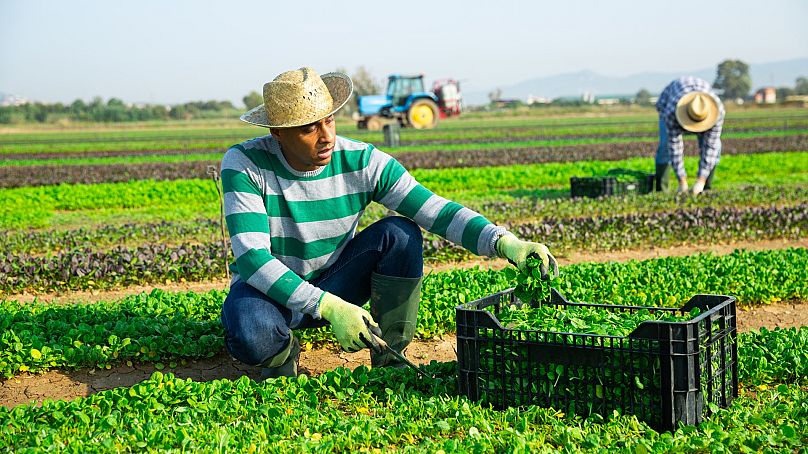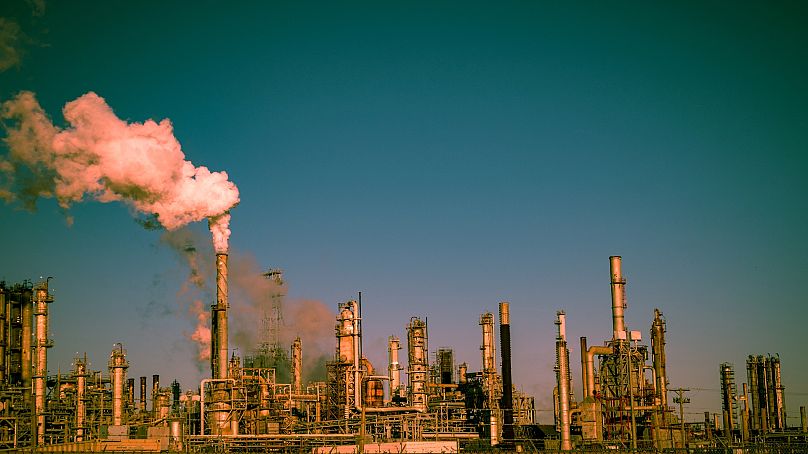For the first in our series of COP28 debates, we discussed why extreme weather events are on the rise, and how the climate crisis is impacting global health.
The impact of heat waves on individuals and global communities is immense and only getting worse, and the cure to this problem is to phase out fossil fuels now, according to Dr Marina Romanello, one of the panelists on our Climate Now live event.
"Fossil fuel phase-out is the most important public health intervention of our times," she said.
Extreme weather events are causing illness and death, while heat waves are reducing productivity, damaging crops, and increasing the spread of vector-borne diseases like dengue and malaria.
Air pollution is affecting global health too, with respiratory and cardiovascular problems brought about by wildfires and the burning of fossil fuels.
With the link between the climate crisis and global health becoming ever clearer, this year's COP28 summit is committed to shining a light on global health. On December 3 the summit held its first-ever "Healthy Day" when over 120 countries signed a Climate and Health Declaration, which committed them to building more climate-resilient health systems and including health targets in their climate action plans.
For our first COP28 Climate Now debate we asked our expert panel: How can we survive the heatwaves to come?
You can watch a replay of the debate, which took place live in Dubai on the sidelines of COP28, here:
Our panellists
Dr Carlo Buontempo, Director, Copernicus Climate Change Service
Dr Marina Romanello, Executive Director, The Lancet Countdown
Dr Maria Guevara, International Medical Secretary, of Medecins Sans Frontieres / Doctors Without Borders
Jeremy Wilks (Moderator)
Why is health the hot topic at COP28?
With over 50 ministers of health at COP28, this is the first time that the link between climate change and the global health crisis has been taken so seriously at the event. There is solid reasoning behind this new approach, according to our panellist Dr Marina Romanello, Executive Director of The Lancet Countdown, an international collaboration dedicated to monitoring the evolving health profile of climate change.
"Things are getting worse very rapidly. To give you just a couple of figures, heat-related mortality of adults over 65 years of age, a vulnerable age group, has increased by 85 per cent since the 1990s alone," Dr Romanello said during the debate.
The link between food and health is also gaining traction, and Dr Romanello added that "127 million more people are now food insecure ... because of the increased incidences of heatwaves and droughts".
Dr Maria Guevara, International Medical Secretary at Medecins Sans Frontieres (Doctors Without Borders) has also seen this in her work.
"We’re seeing doubling and tripling of severe and acute malnutrition cases, especially in the Sub-Saharan region," she said.
While deaths from extreme heat and malnutrition may seem like separate incidents, Dr Romanello was keen to stress the link between them.
"The most concerning thing is that we are monitoring these things in isolation, but we operate in a complex system, so we're being exposed to all of these different hazards in parallel, adding enormous pressure to our health systems," she said.
How can we prepare for extreme heat?
"The climate is now changing at such a rate that we cannot assume that the risks of the past are a good proxy for the risks we are going to face," said panellist Dr Carlo Buontempo, Director of the Copernicus Climate Change Service.
"We have a lot of data, good quality data, about the climate of the past, the present and the future, but this data needs to be contextualised," he told the debate panel.
To help governments do this, Copernicus has created the Copernicus Health Hub, which provides scientists and policymakers with environmental data sets that are pertinent in terms of health and can help them plan for future events.
Early warning systems are another vital tool when it comes to protecting vulnerable communities.
"Early warning systems are frequently found and we have them in many countries. The thing that is a bit more challenging is the early response system that comes after it," explained Dr Romanello.
"What are the interventions that work best? In the case of a heatwave, how do you best reach the vulnerable communities, who are generally socially isolated?" she added.
Dr Romanello went on to share an example with the debate panel from the UK heatwave of 2022 when the UK Health Security Agency (HSA) issued its very first red alert. Thanks to this direct communication, heat-related mortality was reduced when compared to expected models.
The health impacts of working in extreme heat
While data sets and early warning systems can help governments to prepare for extreme heat events, the panel had some advice for how individuals and agricultural workers can look after themselves too.
"The important thing to take into account is that we are not all equally vulnerable to extreme heat exposure," said Dr Romanello.
"If you’re above 65 years of age, or a very young child under one year of age, or living with respiratory disease, cardiovascular disease or kidney disease, then you will be very vulnerable to extreme heat exposure."
In such cases, simple behavioural changes are often the first place to start. Dr Romanello suggested putting the blinds down during the day, staying hydrated and wearing lighter clothes. "These are all things that we’ve all heard of, but surprisingly they’re not done enough," she said.
What about workers who have to be outside in the middle of the day?
Agricultural workers are the group most affected by extreme heat. According to the Lancet Countdown, in 2022, heat exposure-related loss of labour capacity resulted in average potential income losses equivalent to $863 billion (€789 billion).
This is only projected to get worse and by mid-century, if temperatures rise 2°C above pre-industrial levels then heat-related deaths are set to rise by 370 per cent, while heat-related labour loss is likely to increase by 50 per cent.
While hotter weather means that workers will have to take more breaks, Dr Romanello believes that the only way to ensure that bosses factor in these breaks is through regulation.
"You have to regulate it, you have to enforce it. It is a hazard for workers," she said.
"Above everything you need to address the communities directly, help them with change, make sure they have access to shade and cooling and cold water, and help them to protect their health above everything else."
Dr Guevara agreed: "Healthy should be the new normal. It needs to be in all our documents and negotiations. The communities most affected need to get the financial support that they need and the ultimate cure is obviously phasing out fossil fuels."
Would phasing out fossil fuels have a big impact on health?
"By phasing out fossil fuels, we could, our estimates suggest, prevent 1.2 million deaths from outdoor air pollution alone. And a recent estimate suggests it could be up to 5 million deaths and that’s every year," said Dr Romanello.
Dr Buontempo agreed. "This is not new - we have known about the connection between greenhouse gases and climate change since the end of the 19th century. This year the concentration of CO2 has gone up by 2 parts per million."
"If we want to limit the impact, then the mechanism we have at hand is to meet net zero as soon as possible."
While drastically reducing fossil fuel emissions may seem daunting, the reduction of coal-derived pollution in the 21st century shows that changes can be made quickly. According to the Lancet Countdown, deaths attributable to fossil-fuel-derived air pollution have decreased by 17.7 per cent since 2005 due to a fall in coal burning.
How can we adapt and limit the health risks?
Médecins Sans Frontières (MSF) believes the best way to protect people from extreme weather events is to prepare communities through health promotion. In practice, this means providing communities with areas of shelter so they can cool down, and putting in place more early warning systems so that people are warned of incoming storms and extreme weather.
Dr Guevara explained how MSF is trying to adapt to changing weather patterns. "Next year we’re going to do climate scenarios to imagine: What does 2 degrees look like? What does 4 degrees look like?" she said.
"For example, we cannot keep using plastic sheeting in camp situations - it's like an oven - so there needs to be innovation into how we keep the airflow moving.
"IKEA has been working with UNHCR on building structures that are much more eco-friendly and much more adapted to the field settings that we’re going to see in the future."
Cities need to adapt too, said Dr Buontempo. "Cities, as a concept, have never seen temperatures of this size, so the way in which cities work is not designed to cope with these kinds of temperatures. This is uncharted territory."
Computer modelling and AI may be able to provide a helping hand here. The UN Environment Programme estimates that the simple act of planting trees on city streets would give 77 million people a 1°C temperature reprieve on hot days.
While the panel all stressed that there was a lot of urgent work to be done, Dr Buontempo was keen to stress that there is still hope.
"The future is not unknown, we do have information, we are not blind in terms of the changes that are coming. So, for me, we need to use the data we have to inform decisions.
"The future will be different, it will be very different to anything we have seen, and we should be able to improve our ability to use the knowledge that already exists."













